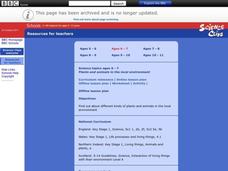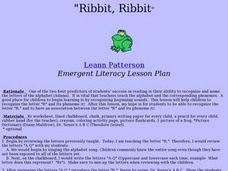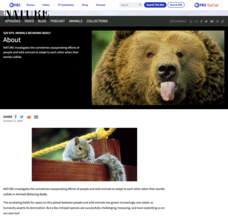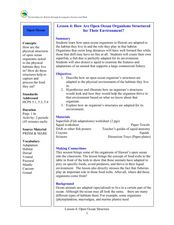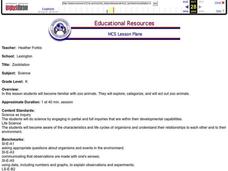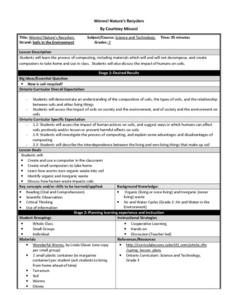Curated OER
Plants And Animals in the Local Environment
Students observe the various living things they can find outside their playground making sure to look both on the ground and in the air. They develop a large poster Venn digram, as a class, of plants and animals that live in the air, on...
Curated OER
Ocean Exploration
Students explore a simulated ocean floor. In this environmental lesson plan, students take on roles of an ocean dive team exploring the ocean floor. Dive logs will be created and the students will explore their sections of simulated...
Curated OER
Hunt for Habitats
Students review components of a habitat and go on a hike around a pond and woods exploring different habitats and the plants and animals that use them. They examine mammal pelts and discuss the life histories, adaptations, and positions...
Curated OER
Critters of the Water
Students examine different organisms in various marine habitats. They identify any adaptations that have allowed the organisms to survive. They develop an imaginary organism and describe its life cycle.
Curated OER
Ribbit! Ribbit!
Students research a frog's life cycle and habitat using books, the Internet and lecture. Students make origami frogs, write letters to Toad from Arnold Lobel's "Frog and Toad" and participate in a simulated camouflage activity.
Curated OER
Exploring the Neighborhood -- Literature Jigsaw
Learners compare and contrast domesticated animals and wild animals. They identify plants and animals that have adapted to different habitats. They discover it is everyone's responsibility to protect the environment.
Curated OER
Animal Habitats and Their Management
Young scholars review components present for a quality animal habitat and then explore a goose pond to find out what animals reside there. They learn how wildlife managers work with the land so everything can co-exist together.
Curated OER
Bird Beak Anatomy
Third graders participate in an activity to determine which tool will work the best to gather food. They create analogies about how the experiment relates to birds. They brainstorm about which adaptation helps or hurts the survival of an...
Curated OER
Color Your World with Changes --- the Camouflage Game
Seventh graders, after predicting dominant colors foud in their habitat or garden, visit heir area on a monthly basis. They search for colored toothpicks, then graph the results, determining the dominant color for the month.
Curated OER
Wild Lion Vets
Learners research and explore the "king of the beasts" then make their own field guide of cats by doing research on each one and including information such as appearance, habitat, range, and food.
Curated OER
Animals and People: Who's Behaving Badly?
Students explore the relationship between human beings and animals. They participate in a variety of activities to examine animal behavior. Students create a class book and stage a mock news broadcast.
Curated OER
How Are Open Ocean Organisms Structured for Their Environment?
Students explore biology by conducting an animal dissection. In this oceanography lesson, students identify the life cycle of a squid and other animals that are involved with commercial fishing. Students dissect a squid in class and...
Ocean Explorer
Easy as Pi
Seamounts are large, extinct volcanoes that rise up from the bottom of the ocean floor. They are a relatively new landform in the scientific community, and this instructional activity invites students to learn about the amazing diversity...
Curated OER
How to Hide in the Ocean
Students observe and discuss the advantages of camouflage, then try their hands at designing a well-camouflaged fish.
Curated OER
Bird Airport Control
Students visit a local wetland and record observations of waterfowl on downloadable worksheets. They compile class data and list similarities and differences among species of birds observed.
Curated OER
Build Your Own Insect Trap
Learners ask testable questions. They explain the relationship between insect behavior and insect trapping techniques. Students design their own insect traps to collect a new unknown insect, in the same way that entomologists collect the...
California Academy of Science
Snakes and Lizards Length and Movement
Snakes and lizards can be very tiny or very long. Your class will get out their rulers to see just how big snakes and lizards can be. They discuss several different reptiles by reading the included animal fact cards, then each small...
Curated OER
Zoobilation
Youngsters become familiar with zoo animals. They sort them into categories, and choose an animal to act out. Two zoo centers are created in the classroom that have examples of the animals for the pupils to play with. Then, they choose...
Curated OER
Salmon in the Classroom
Students list the salmon life cycle stages in order. They draw a stream with the vegetation, animals, and water quality parameters that are necessary for salmon survival. Students explain the connection between animal morphology and...
Cornell Lab of Ornithology
Amazing Birds
What's so amazing about birds? Find out just how amazing birds are with a physics of animal behavior unit created by Cornell Lab of Ornithology. Have learners explore and tap into their observational skills and notice how birds fly, what...
Curated OER
Week 8 - Sea Life
Using a magnifier, mini marine biologists examine the barbules of a bird feather. They swirl the it into a mixture of oil and water and then re-examine the feather. After the activity, discuss how the oily feathers pose a problem to sea...
Curated OER
The Great Pond Safari
Students study pond life by visiting a pond and completing an associated worksheet. They play an online game based on the pond learning experience.
Curated OER
Worms, Nature's Recyclers!
Students study what worms need to survive in different environments. They study how worm composting improves soil and reduce waste. They discuss composting techniques and present a puppet show about a worm's life.
Curated OER
Aquatic Exotics
Students identify and describe the aquatic exotic species found in Illinois. Using the internet, they research the species origins and discover their effects on native species in the area. They discuss how appropriate it is to introduce...
Other popular searches
- Animal Habitats Adaptation
- Animal Adaptation Habitat
- Penguins Adaptation Habitat
- Penguin Adaptation Habitat
- Bird Habitat and Adaptation
- Habitat and Adaptation


